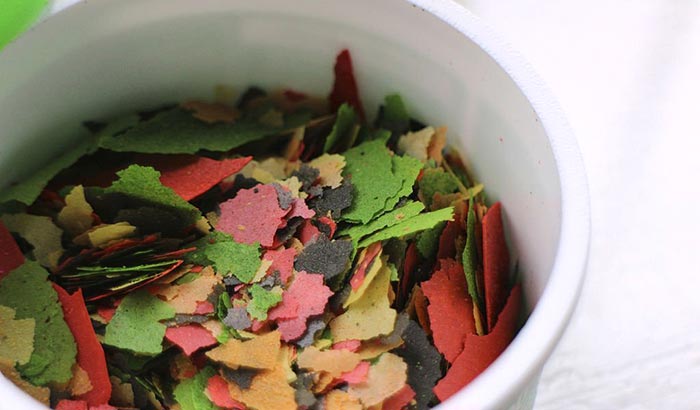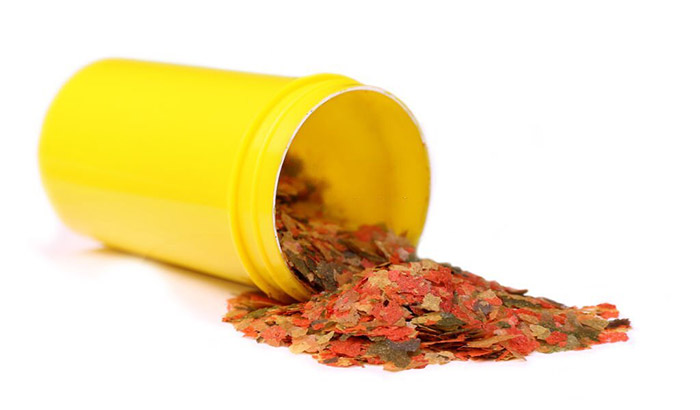Have you ever wondered what are fish flakes made of? Did you ever stop to ask what’s in the fish flakes before dropping them into the tank? As a fish keeper, you should know the best food to give your fish. Know what benefits it has for your fish, or maybe learn how to make it yourself.
Common Ingredients
To give your fish the necessary food for growth, learn to choose the food. The critical nourishment for the fish’s growth is amino acids and fatty acids. You can find these, along with many other vitamins and minerals in fish flakes.
Fish flakes are generally made of smaller marine animals with high bone density and oil content. These fishes are not what you see in the market. Fish used to make fish flakes are not usually consumed by humans.
Initially, the manufacturers dried the marine animals out in the sun. Once dry enough, they were pounded down then cut into flakes. However, this old process fails to provide quality on par with modern methods.
The modern method uses machines that cook the fish first. Then, they are pressed to remove the excess oil and dried. Lastly, they are grounded up and are turned into flakes by the machine.
Today, with the advent of technology, more and more aquatic life is used to make fish flakes. If you look for fish flakes or other fish foods in the market, you might notice that they have shellfish or plants in the ingredients.
Nutritional Content
The amino acids that make up protein from fish are an essential nutritional value of fish flakes. Protein provides your fish.
The carbohydrates and fatty acids, on the other hand, give your fish their required energy. And vitamin B boosts their immune system.
The other vitamins and minerals in fish flakes also include but are not limited to Vitamins B1, B2, B6 and B12, Iodine, Zinc, Niacin, Manganese, Biotin, Calcium, Potassium, and Magnesium.
Fish flakes made partially or wholly of plants can offer similar nutritional content but at lower levels. Though these have dietary values of their own, they are insufficient to provide your fish with the necessary vitamins and minerals for growth.
They are okay to feed your fish for a time, but eventually, your fish will need fish flakes with high nutritional content. However, keep in mind that there are herbivore fish that can only intake vegetables.
Additionally, keep in mind that fish flakes are for fish that swim near the surface and in the middle of the water. They become nutritionally worthless as they slowly sink and dissolve in water.
Understand the needs of each of your fish before deciding which fish flakes to feed them. As a responsible fish owner, you should prioritize the health of your fish.
Contents
How to Make Fish Flakes at Home
If you want to be extra sure on what are fish flakes made of. You can try making them yourself.
Ingredients Needed
You can make fish food using various methods, such as using gelatin or turning them into ice cubes. To make fish flakes specifically at home, you can use ingredients you will find in the market.
- Fish and/or shrimp
- Vegetables use any 2 – 4 of your choice (optional)
- Oatmeal (optional)
- Fruits (optional)
Process
Basically, try to replicate the process the machines use to make fish flakes. Steam the fish and hard vegetables to soften. Press them gently using a paper towel or a clean cloth. Then dry them out in the sun along with the fruits.
Make sure they all get dry enough for grounding. (Skip to the cutting of the fish into flakes if it is the only ingredient you used). Put them in a blender and grind them all. To make them stick together, take the oatmeal, put it in the blender, and add some water.
Carefully add the water so the mixture will not get runny. You want a thick but spreadable consistency. Next, get a tray and layer it with baking paper. Then, spread a thin sheet of the mixture onto it. You can now bake it at low heat for a couple of minutes, just enough to remove the moisture.
Finally, you can cut them into flakes and feed them to your fish.
Conclusion
Give a lot of thought to what you feed your fish. Know what are fish flakes made of and their nutritional benefits to your fish. It is especially hard to tell if a fish is sick or in need of nourishment.
You don’t want to find that they are sick when the illness is too far gone. Feeding your aquatic friends with fish flakes containing proper nutritional values can quench their hunger and add to their robust health.


